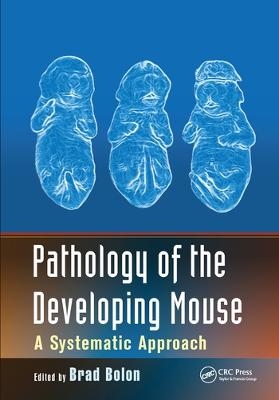
Pathology of the Developing Mouse
CRC Press (Verlag)
978-0-367-57577-9 (ISBN)
Pathology of the Developing Mouse provides, in so far as feasible, one complete reference on the design, analysis, and interpretation of abnormal findings that may be detected in developing mice before and shortly after birth. In particular, this book is designed specifically to be not only a "how to do" manual for developmental pathology experimentation in mice but, more importantly, a "how to interpret" resource for pathologists and other biomedical scientists faced for the first or hundredth time with defining the significance of distorted features in some fantastic murine developmental monstrosity.
The topics covered in this volume include a full range of subjects encountered when building and wielding a developmental pathology tool kit:
baseline anatomic and physiologic traits of developing mice
principles of good experimental design and statistical analysis for mouse developmental pathology studies
procedures for anatomic pathology examinations, to evaluate structural changes at the macroscopic (gross), microscopic (cells and tissues), and ultrastructural (subcellular) levels, suing conventional autopsy-based or novel non-invasive imaging techniques;
methods for clinical pathology testing, to assess the biochemical and cellular composition of tissues and fluids;
options and protocols for in situ molecular pathology analysis, to undertake site-specific explorations of the various mechanisms responsible for producing adverse findings (i.e., "lesions") during development; and
well-referenced and illustrated guides to the interpretation of anatomic pathology and clinical pathology changes in the animal (embryos, fetuses, neonates, and juveniles) and its support system (placenta).
Brad Bolon, DVM, MS, PhD, is a Diplomate of both the American College of Veterinary Pathologists (DACVP) and the American Board of Toxicology (DABT) as well as a Fellow of both the Academy of Toxicological Sciences (FATS) and the International Academy of Toxicologic Pathology (FIATP). He is currently an associate professor in the Department of Veterinary Biosciences, College of Veterinary Medicine and also the associate director of the Comparative Pathology and Mouse Phenotyping Shared Resource, Comprehensive Cancer Center at the Columbus campus of The Ohio State University (OSU). His main professional interests are the pathology of genetically engineered mice (especially embryos, fetuses, neonates, and placentas) and toxicologic neuropathology.
INTRODUCTION. The Case for Developmental Pathology and Developmental Pathologists. FUNDAMENTALS OF MOUSE DEVELOPMENTAL BIOLOGY. Essentials of Mouse Genetics and Nomenclature. Essential Terminology for Mouse Developmental Pathology Studies. Anatomy and Physiology of the Developing Mouse and Placenta. Teratogens and Teratogenic Mechanisms in Mouse Developmental Pathology. EXPERIMENTAL METHODS IN MOUSE DEVELOPMENTAL PATHOLOGY. Principles of Experimental Design for Mouse Developmental Pathology Studies. Necropsy Sampling and Data Collection for Studying the Anatomy, Histology, and Pathology of Mouse Development. Clinical Pathology Analysis in Developing Mice. Histotechnological Processing of Developing Mice. Localization of Gene Expression in Developing Mice. Protein Localization in Developing Mice. Quantitative Morphological Assessment in Mouse Developmental Pathology Studies. Ultrastructural Evaluation of Developing Mice. Three-Dimensional Imaging in Mouse Developmental Pathology Studies. ANALYTICAL PRACTICES FOR MOUSE DEVELOPMENTAL PATHOLOGY. Pathology of the Developing Mouse from Conception to Weaning. Pathology of the Placenta. Mouse Developmental Pathology Assessments in High-Throughput Phenogenomic Facilities. A Statistical Analysis Primer for Mouse Developmental Pathology Studies. COMMON ABBREVIATIONS IN MOUSE DEVELOPMENTAL PATHOLOGY STUDIES. INDEX.
| Erscheinungsdatum | 01.07.2020 |
|---|---|
| Verlagsort | London |
| Sprache | englisch |
| Maße | 178 x 254 mm |
| Gewicht | 453 g |
| Themenwelt | Naturwissenschaften ► Biologie ► Genetik / Molekularbiologie |
| Naturwissenschaften ► Biologie ► Humanbiologie | |
| Naturwissenschaften ► Biologie ► Zoologie | |
| ISBN-10 | 0-367-57577-9 / 0367575779 |
| ISBN-13 | 978-0-367-57577-9 / 9780367575779 |
| Zustand | Neuware |
| Haben Sie eine Frage zum Produkt? |
aus dem Bereich


